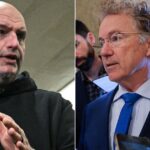“The mission of the National Oceanic and Atmospheric Administration (NOAA) is to provide daily weather forecasts, severe storm warnings, climate monitoring to fisheries management, coastal restoration, and the supporting of marine commerce.”
That’s a pretty straightforward mission. In fact, it’s right there on the homepage of the NOAA on the U.S. Department of Commerce’s website, which administers the weather forecasting service. Its job should be dry, scientific and factual in nature.
But, leave it to the outgoing administration of President Joe Biden to decide that the folks in charge of tracking storms and forecasting whether it’ll rain or snow needed a bit of “Indigenous Knowledge” injected into it.
According to a Tuesday report from the Washington Free Beacon, the effort is what writer Joseph Simonson described “as part of a last-minute push in the federal government to embrace what scientists call pseudoscience.
“NOAA is excited to team up with the American Indian Higher Education Consortium to accelerate information-sharing aimed at building climate resilience, adaptation and co-production of knowledge in communities across the United States and tribal nations,” said NOAA Administrator Rick Spinrad in a media release.
“Indigenous Knowledge has made it possible for Indigenous Nations to persist and thrive for millennia. These knowledge systems are needed more than ever to inform NOAA and our nation’s approach to environmental stewardship.”
“The American Indian Higher Education Consortium is honored to partner with NOAA to collaborate on shared goals and issues,” said Ahniwake Rose, AIHEC president and CEO.
“This collaboration will create opportunities for our faculty and students, combine Indigenous Knowledge with western science to achieve strong climate resilience for our tribal nations and across the country and empower our tribal colleges and universities to be leaders in the ongoing response to climate change.”
Now, most of these NOAA/AIHEC agenda items are vague box-checking items that sound a whole lot like gobbledygook that looks good on a website. Talk of how the agreement would “empower our tribal colleges and universities to be leaders in the ongoing response to climate change” is basically woke lorem ipsum stuff for these kinds of media releases.
Is “indigenous knowledge” simply another way for the left to eat away at Western culture?
Yes: 82% (9 Votes)
No: 18% (2 Votes)
However, there were a few phrases in there that, if you paid close attention in between the wokespeak, didn’t exactly augur well for how this will impact the NOAA.
For instance, the release talks about how the agreement would “advance Indigenous Knowledge, science, technology, education and workforce training opportunities.” One of the bullet points of how this would have an affect is in “[i]dentifying western science and Indigenous Knowledge priorities for the AIHEC.”
That may sound vague enough, but it’s not.
“‘Indigenous Knowledge’ is a discredited belief system posting that native-born peoples possess an innate understanding of how the universe works,” Simonson noted in his piece.
“While scientists have referred to its ideas as ‘dangerous’ and a rejection of the scientific method, those criticisms have not stopped the Biden administration from ordering the federal government to consider ‘Indigenous Knowledge’ when implementing rules and regulations.
“President Joe Biden issued a memo in November 2022 that directed more than two dozen federal agencies to apply ‘Indigenous Knowledge’ to ‘decision making, research, and policies,’” Simonson continued. “The memo called on agencies to speak with ‘spiritual leaders’ and reject ‘methodological dogma.’”
Considering that forecasting whether it’s going to rain cats and dogs or whether the sun will shine brightly requires a whole lot of “methodological dogma,” that is indeed an issue.
And what “Indigenous Knowledge” are we going to consider at the NOAA? Because, the Partnership With Native Americans noted in a 2017 article, the rain dance is still a thing among many indigenous American Indian tribes.
“As a Lakota, I always found it stereotypical when asked about the rain dance. In all my life, I had never heard of any rain dance taught in Lakota culture. Why? Because, we don’t practice it. The assumption of the practice still persists, however, and it’s worth investigating where this idea originated,” the writer noted.
“It was only recently, for instance, that I learned the rain dance is actually a fairly common practice among southern tribes. These tribes typically reside in dry climates, where water is essential to life, making it something of a cornerstone in those cultures. Rain, specifically water, is important to sustaining life for all communities, but for some this precious resource is scarce.”
“One of the tribes that practices the rain dance still today is the Ohlone, located in a small town in the southern central part of California. And in a small town, it is said, ‘when you call a rain dance, word gets around.’ In Ohlone culture, the dance is greatly respected, with pure intent and high significance. After a three-year drought, they attributed the returning rain to their dances.”
Will the NOAA be holding discussions with the Ohlone? After all, this is part of the body of “Indigenous Knowledge,” which encompasses a wide variety of cultures and traditions we lump under the aegis of “Native American.” Who’s to say that tribes which place a strong emphasis on traditions that use rain dances or whose views on the environment are entwined with animism, say, have believes that are less valid than the Lakota, who don’t practice those things?
I mean, aside from the fact that it’s entirely unscientific — but then again, “Indigenous Knowledge,” if scientific, is simply “knowledge.” Western culture managed to figure that out on its own, in fact. That means there’s no need for any sort of partnership — unless, of course, the whole idea is to eat away at Western culture.
So is this just woke posturing, or are we going to see Jim Cantore consulting an Ohlone elder/NOAA surrogate on the Weather Channel the next time a hurricane makes landfall?
Enquiring minds want to know — but either way, it’s a fitting manner for this wretched administration to go out on.
Advertise with The Western Journal and reach millions of highly engaged readers, while supporting our work. Advertise Today.






